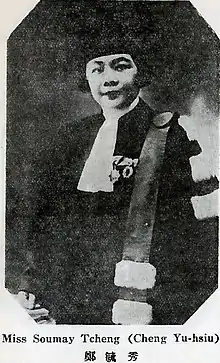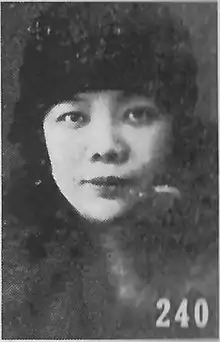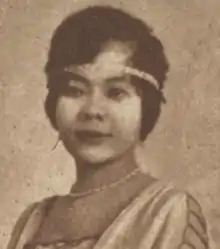Tcheng Yu-hsiu
Tcheng Yu-hsiu (Chinese: 鄭毓秀, 1891–1959), also Soumay Tcheng and Madame Wei Tao-ming, was the first female lawyer and judge in Chinese history.
 Who's Who in China 4th ed. (1931) | |
| Born | March 20, 1891 Xin'an County, Guangdong, China (Great Qing) |
| Died | December 16, 1959 (aged 68) San Francisco, California, United States |
| Other names | Soumay Tcheng Soumé Tcheng Madame Wei Tao-ming (married name) |
| Occupation | Lawyer, judge, revolutionist, politician, writer |
| Political party | Chinese Nationalist Party |
| Spouse(s) | Wei Tao-ming |
| Relatives | Ching Ho Cheng, Paifong Robert Cheng |
| Tcheng Yu-hsiu | |||||||||
|---|---|---|---|---|---|---|---|---|---|
| Traditional Chinese | 鄭毓秀 | ||||||||
| Simplified Chinese | 郑毓秀 | ||||||||
| |||||||||
Yu-hsiu studied in Paris, returned to Shanghai to practice law, was president of a court in the French concession, then served in the national Legislative Yuan, and from 1931 to 1937 was president of University of Shanghai school of law.[1]
Biography
Tcheng was first home-schooled, then was taken by her mother to enroll in a formal school in Beijing. Her revolutionary activities began with her family, as she refused to have her feet bound or to marry the man picked by her paternal grandmother. Her family sent her to a mission school in Tianjin, where she learned English but refused the religion. In 1912, she met the anarchist and revolutionary organizer Li Shizeng and enrolled in the school to prepare to go to France on the Diligent Work Frugal Study program. The school was the first in China to be co-educational. She was one of the handful of women to go to France on the program.[1] She wrote later that she and Li were part of a terrorism cell which was involved in the attempted assassination of Yuan Shih-k'ai, who had taken power from Sun Yat-sen.
By 1914 she had established herself in Paris, where she probably met other such Chinese as Wang Jingwei. In 1919, she put her French language skills to work as attachė to the Chinese delegation at the Paris Peace Conference. After the war she met and married the lawyer Wei Tao-ming. She received her law doctorate from University of Paris in 1926, and returned to China. She and her husband established a law practice in Shanghai, where she became a judge in a French concession court.[2]


She advocated women having their own voices and choices in marriage, and wrote it into the Republic of China's law. She is cited as one of the influences which guided Phan Bội Châu's development of women's rights in Vietnam.
Tcheng's nephew Paifong Robert Cheng attended the Sorbonne University under the guidance of his aunt. He held the diplomatic post of the Chinese Ambassador to Cuba from 1946–50. Cheng's son Ching Ho Cheng is an American contemporary artist whose works are collected by several museums across the U.S.
Her autobiography, My Revolutionary Years (1944), published while her husband was Ambassador to the United States, is first hand accounts of modern Chinese history and has been translated into many languages.
She died of cancer in Los Angeles, 16 December 1959.[3]
Selected works
- Wei, Yü-hsiu (Chêng) (1920). Souvenirs d'enfance et de révolution. Translated by Van Vorst, John (B. Van Vorst). Paris, Payot & cie.(in French)
- Wei, Yu-hsiu [Cheng] (1943). My Revolutionary Years: The Autobiography of Madame Wei Tao-ming. New York: Scribner's sons.
- Yü-hsiu CHÊNG (1925). Le Mouvement constitutionnel en Chine. Étude de droit comparé, etc.(in French)
- Wei, Yü-hsiu (Cheng) (1927). Zhongguo bi jiao xian fa lun. (in Chinese)
- Wei, Yu-hsiu [Cheng] (1926). A girl from China (Soumay Tcheng). Translated by Van Vorst, Bessie (McGinnis). New York: Frederick A. Stokes company.
See also
References
- Boorman & Howard 1967, p. 278.
- Boorman & Howard 1967, p. 279.
- Boorman & Howard 1967, p. 280.
Bibliography
- Boorman, Howard L.; Howard, Richard C. (1967). Biographical Dictionary of Republican China. 1. New York: Columbia University Press. ISBN 0231089589.
External links
 Media related to Zheng Yuxiu at Wikimedia Commons
Media related to Zheng Yuxiu at Wikimedia Commons- Madame Chiang in Hollywood, Life, April 19, 1943.
